Is Milk Good For Bulking? Benefits Explained
Author:
Unlock your full potential by engaging with our experts and community! Have questions about your fitness journey or looking for expert advice on weightlifting techniques? Don’t hesitate — leave a comment below and Jacek Szymanowski will provide a personalized answer and insights to help you reach your goals.
Torokhtiy is reader-supported. Some links are affiliate links, and we may earn a commission at no extra cost to you. See our disclosure page for details.
Milk is a popular choice among individuals looking to bulk up their muscle mass. Not only does it contain high-quality protein, but it is also a source of vitamins and minerals.
In this article, you will learn the benefits of milk for bulking and also some lean bulking tips. In most parts of the article we will focus on cow’s milk in particular and talk about alternative milk like plant-based milk where need be.
In the end, you will have an answer to the popular question “Is milk good for bulking”?
Milk is good for bulking because it’s a quality source of calories, fat, carbs, protein and other nutrients needed for bulking. If your concern is “Is milk good for bulking” and you don’t feel discomfort after drinking milk, do consume milk because of its nutritional profile and flexibility for bulking.
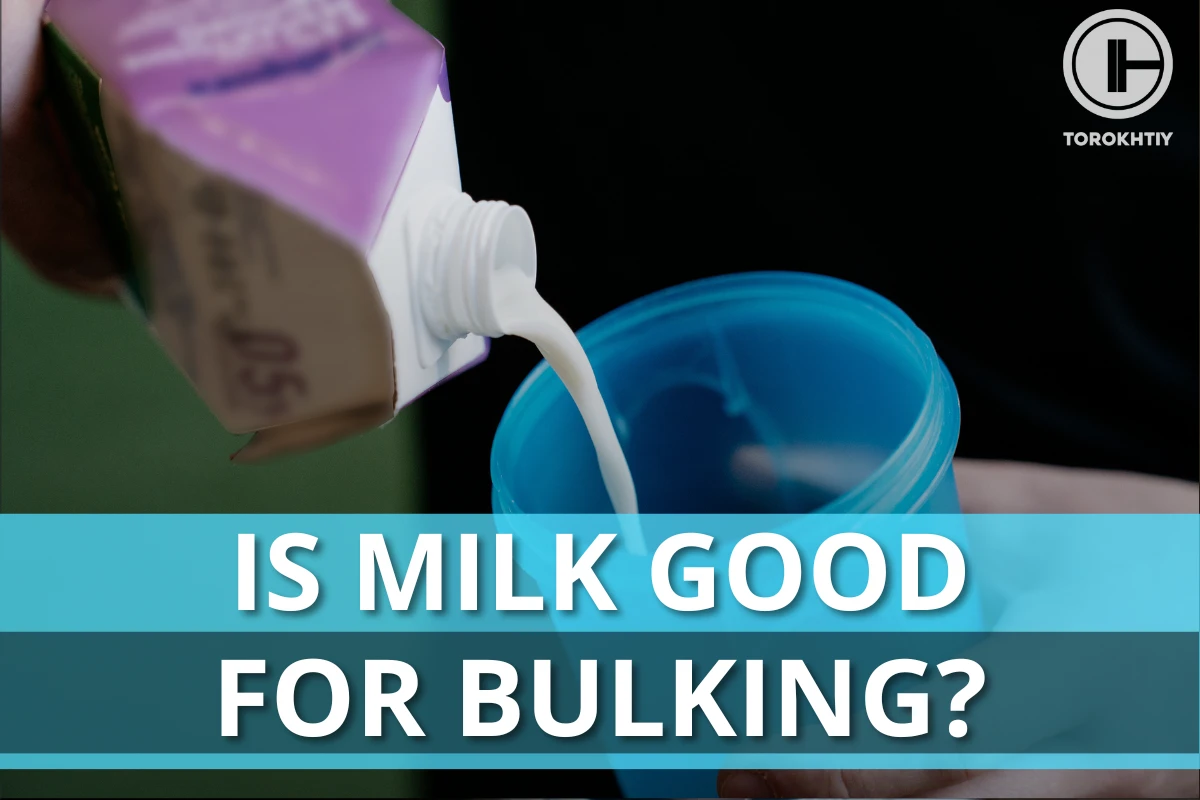
Is Milk Good for Bulking?
When it comes to bulking, milk can be an option for individuals seeking an increased muscle mass, it could be cow milk or plant-based milk, for clarification sake, cow milk can be in the form of skimmed, semi-skimmed, and whole milk.
The three forms of cow milk are differentiated by their fat contents with whole milk having a high fat content while skimmed milk contains a lesser amount of fat. Whole milk is higher in calories as a result provides energy that can support a caloric surplus necessary for bulking and it’s by far the best milk for bodybuilding.
Plant-based milk is derived from plants, particularly seeds, fruits, and legumes. Almond, coconut, and soy milk are the popular types of plant-based milk. They are an alternative to cow milk and could also be a go-to for vegans or other people who do not take animal-derived products for a reason (e.g. lactose intolerant). Both cow milk and plant-based milk are good sources of calories, protein, and fat.
Additionally, in the early 90s bodybuilders often consumed milk after workout due to its nutritional content for muscle growth. Milk contains two quality forms of protein – whey and casein which are essential in bulking. More so, cow milk is rich in essential nutrients like calcium, vitamin D, and vitamin B12.
As the muscle increases, calcium helps to support them by the overall maintenance of bone health. Vitamin D being a constituent also helps muscle contraction and movement during exercise, it aids the absorption of calcium and phosphorus by the body and also helps in the production and regulation of hormones like testosterone which are important for muscle growth.
Overall, the content of milk which has been discussed above makes it a good option for bulking. However, consuming only milk to gain weight or bulking will never be enough. Individuals should consume other high-caloric food and participate in resistance training to actualize their bulking dreams. Lastly, we hope we have clarified your concern “is whole milk good for bulking”.
Benefits of Milk for Bulking
When it comes to bulking milk can be a very good choice, although part of its benefits which makes it a good choice for anyone willing to increase their muscle mass has been discussed above. In this section, we will talk about the key benefits of milk in your bulking diet in detail.
1. Versatility
The importance of milk for bulking goes beyond its good nutritional profile, it is a versatile beverage that you can easily add to your shakes, and smoothies or pour directly into your cereals, or take on its own.
In addition to versatility, it is generally affordable and available in stores in almost in not every part of the world. Milk can easily be taken on the goal and it’s a good option to establish a routine.
2. Source of Additional Protein
Every individual requires protein for the general building of the body. In a liter of milk, there are about 32 g of milk or let’s just say you will get around 8 grams of protein in a cup of milk.
Milk is a great source of two types of quality proteins – whey and casein. When you take milk you get 82% casein and 18% whey protein, these two types of protein are important for building muscle mass, improving strength, and general athletic performance.
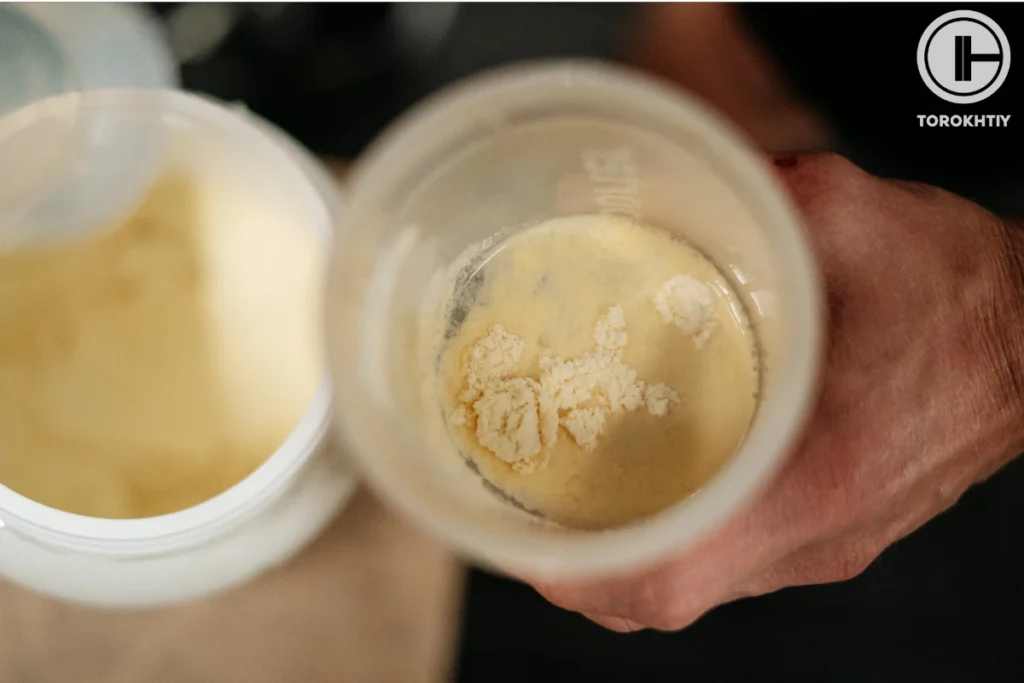
3. Great Way to Improve the Texture of Protein Shake
Firstly, if you have ever taken protein powder with milk, congratulations! Why? Because not only does milk serve as a source of additional protein it also improves the taste and texture of protein shakes.
Milk makes protein appealing to drink, even if the shake looks chalky, milk gives them a smoother and creamy texture.
4. High in Calcium
Milk is one of the greatest sources of calcium. For women who are in the age range of 19-50, the recommended dietary allowance for calcium is 1,000 mg per day, the RDA for men between age 19 to 70 is also 1,000 mg.
However, women who are above 51 years of age and men who are above 71 years old are recommended to take 1,200 mg daily. In a single cup of milk, you will get about 306- 325 mg of milk which is a good way to get part of the calcium needed by the body per day.
Calcium being a constituent of milk helps to support muscle and helps to maintain strong and healthy bones.
How Much Milk Can Be Consumed When Gaining Weight?
To maximize the benefits of milk for weight gain and muscle building, a moderate amount of milk can be drunk alone or along with smoothies, protein shakes, and cereals.
Whole milk is the best milk for muscle growth and weight gain as it contains more fat than skimmed milk and any other form of milk, which can be helpful to reach the optimal calorie surplus.
However, you can decide to take any amount of cow’s milk that is convenient for you, it could be 250ml, 500ml, 1L per day or even more. As long as it doesn’t have any negative effect on your health and weight management goals.
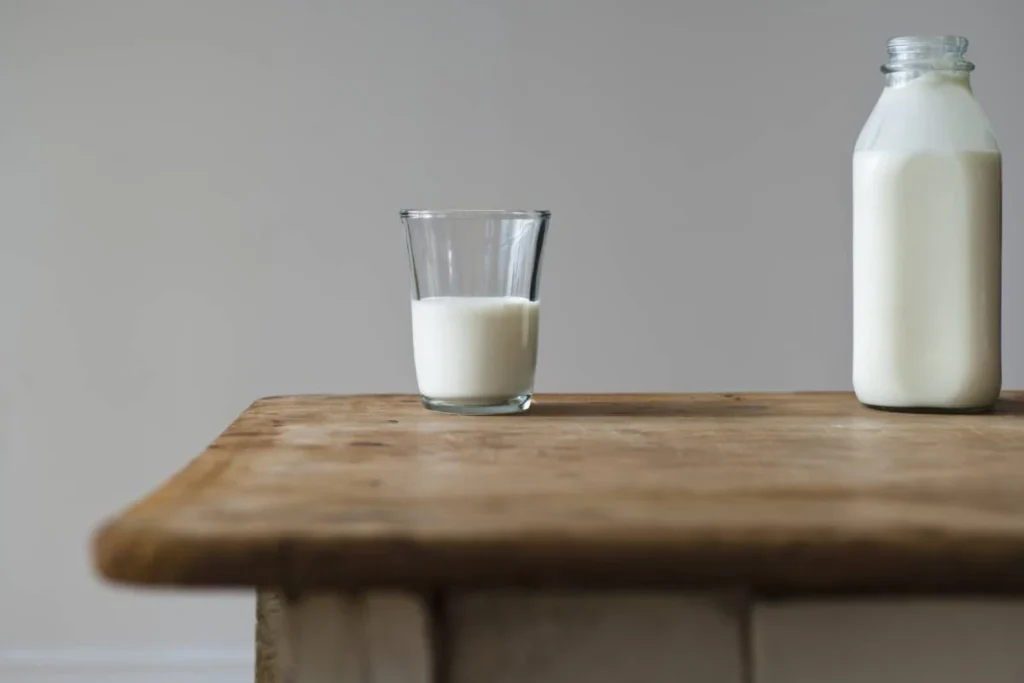
Who Is Cow’s Milk Not Suitable For?
While milk offers numerous benefits for bulking, it may not be suitable for everyone. Here are some individuals who should exercise caution when consuming cow’s milk:
1. If You Are Allergic to Milk
Allergies to proteins found in cow milk can vary in severity ranging from mild to severe. Some people may only experience symptoms like hives or itching while others might have serious reactions such as difficulty breathing or anaphylaxis.
Cow milk could be regarded as the best milk for bulking but If you have ever felt any condition stated above after consuming it, then cow milk is not for you. Individuals with milk allergies must seek advice from a healthcare professional to determine the course of action.
In instances, there are milk options available such as almond milk, soy milk, or oat milk which can serve as suitable alternatives. These non dairy alternatives come in flavors thereby offering a range of nutritional profiles ensuring that individuals with milk allergies can still enjoy a diverse selection of beverages and dishes.
2. If You Are Lactose Intolerant
If someone is lactose intolerant, drinking cow’s milk can cause symptoms, like gas bloating and diarrhea. Lactose intolerance happens when the body doesn’t have enough of the enzyme called lactase that breaks down lactose.
When there isn’t lactase, the lactose in milk doesn’t get properly digested, leading to discomfort. Thankfully, plant-based milk like soy milk is available in the market for anyone willing to bulk up with milk.
Soy allows you to enjoy the taste and nutritional benefits of milk without discomfort caused by lactose.

3. Lean Bulking Tips
One common concern when bulking is the potential for gaining excess fat along with muscle mass. However, with the right approach, it is possible to achieve lean bulking, which focuses on gaining primarily muscle and minimizing fat gain. Here are some tips to help you on your lean bulking journey:
4. Choose a Small to Moderate Caloric Surplus
It is essential to maintain a moderate calorie surplus to prevent excessive fat gain. Aim for a surplus of around 250-500 calories per day, focusing on nutrient-dense whole foods.
5. Get Your Protein
The importance of protein in muscle building can not be overstated. To enhance muscle strength and size, study shows that consuming at least 1.6g of protein per kilogram of your body weight every day is enough.
Aside from consuming protein, take enough calories to reach the desired surplus, spread calories between fat and carbs in a way that’s most convenient for you. Remember! The best diet plan is the one you can stick to in the long term and both carbs and fats are important for your performance and health.

6. Engage in Resistance Training With Progressive Overload
No matter the amount of milk or any other proteinous food you might consume, if you don’t participate in resistance training most likely there might be zero results. Undergoing well-structured resistance training is your key to proper muscle growth.
7. Sleep 8-9 Hours a Day
Firstly, your body needs enough time to rest and recover. Apart from sleep being a way to recharge the brain and the entire body, getting quality sleep helps your muscles grow properly. You are advised to sleep for about 8-9 hours a day.
Sleep deprivation can hinder muscle growth and promote fat gain. During deep sleep, the body releases growth hormone, crucial for muscle repair and growth. Inadequate sleep disrupts this process, impacting recovery.
Moreover, sleep deprivation can elevate cortisol levels, promoting muscle breakdown and fat storage. Additionally, it affects insulin sensitivity, potentially leading to increased fat accumulation. Prioritize sufficient, quality sleep for optimal muscle growth and fat management.
8. Be Consistent
Taking your shakes with milk for muscle building can’t make you achieve your bulking goal overnight, more so, putting all we have said into play for just a few days won’t bring out any tangible result. You need to be consistent and give it all it takes to achieve your goal.

9. Limit Weight Gain to ~1% Of Total Body Weight per Month
Aim to limit weight gain to around 1% of your total body weight per month. Advanced athletes may want to target a slower rate, about 0.25%. If you’re a woman, split those numbers in a half.
Consider factors like training experience and genetics. Experienced lifters may gain muscle at a slower rate compared to beginners. Some individuals are predisposed to gaining muscle more easily, while others may gain fat more readily. Be prepared to adjust your approach based on your individual response.
Lastly, maintain a moderate calorie surplus. Monitor your progress and adjust as needed to make outcome based decisions – not guessing. Consistency is crucial, and consulting a coach or nutritionist can help you create a personalized plan.
The Mass Gainer We Recommend
Transparent Labs Protein Series Mass Gainer
- Diet Type (Best For): Build muscle, Mass gainer
- Suitable For Vegans: No
- Protein Source: Grass-Fed Whey Protein Concentrate
- Serving Size: 194 grams (2 scoops)
- Price Per Serving: ~$5.33
- Proteins: 53 grams
- Carbohydrates: 110 grams (depends on flavor)
- Fat: 14 grams (depends on flavor)
- Calories Per Serving: 750 (depends on flavor)
- Company Founded: 2015
- Recommended By Athletes: Hafþór Júlíus Björnsson, Terron Beckham, Paul Sklar
If you are considering a mass gainer to assist you in actualizing your goal then take a look at MASS GAINER by Transparent Labs. Firstly, Transparent Labs is a reputable company known for producing quality supplements, we can assure you that MASS GAINER is not an exception.
For every serving, you get 51-53g of protein per serving which comes from grass-fed whey concentrate. It also comes in two different flavors so you can select between them.
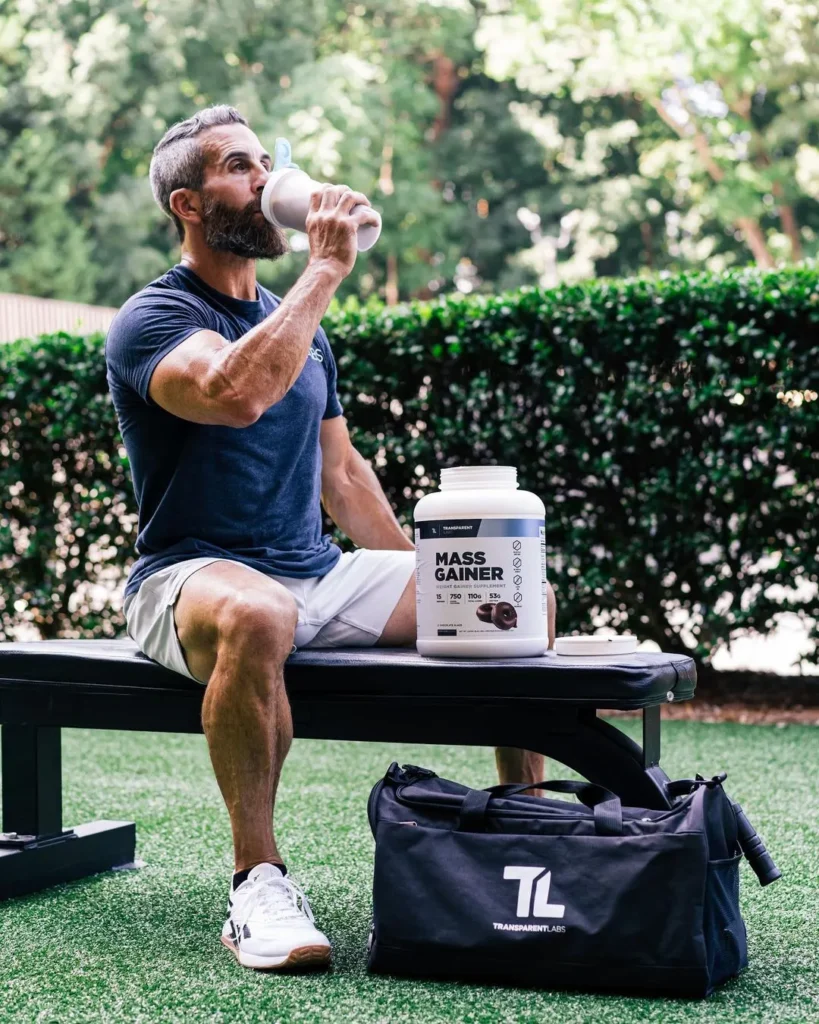
One good part of this product is that each serving comes with 3g of creatine monohydrate. Additionally, 750 calories, about 106-110 g carbs, and 4-6 g fibers are delivered in each serving.
No doubt for a product of this quality you should not expect a cheap price. It costs ~$ 5.33 per serving.
It has zero artificial sweeteners and coloring. ProteinSeries MASS GAINER is gluten-free and NON-GMO so you can be sure you are consuming a safe product.
The protein we recommend
Huge isolate protein by Huge is made with high-quality whey protein isolate which is well known for its ability to improve muscle mass. What’s a protein without good taste? It comes in choco madness and delicious fruity cereal flavors.
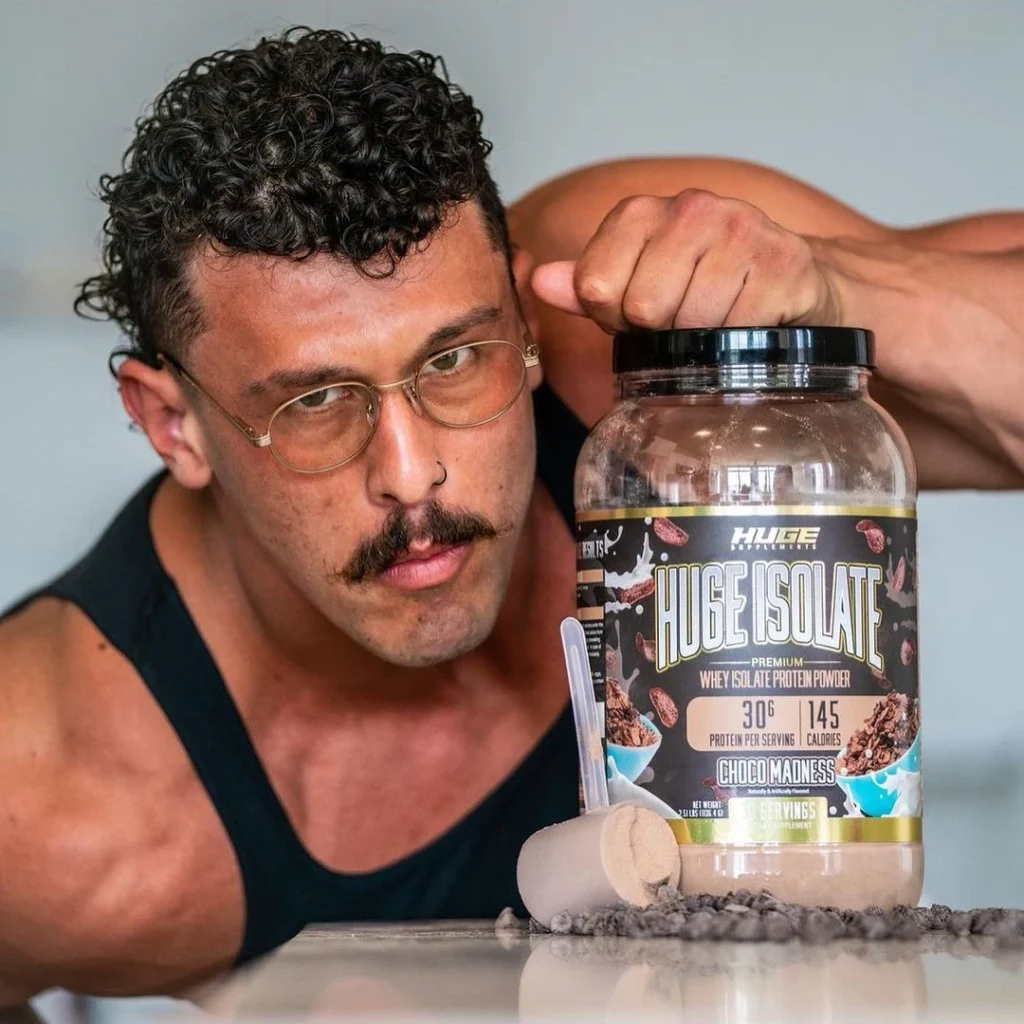
Each serving costs ~$2 and it comes with 30 g of protein. Huge isolate protein is certified as safe to consume because it is produced in FDA-approved GMP-certified facilities in the USA.
FAQ
Is Milk Good for Building Muscle?
Yes, the constituents of milk make it a good option for building muscle, casein and whey protein found in milk are complete proteins known for building muscle. Its calcium and vitamin content also make it a valuable addition for health and muscle function .
How Much Milk Should I Drink for Bulking?
There is no limit to the amount of milk you can take for bulking provided that you don’t experience any negative effects. Think about milk as another tool in your toolbox and use it when it is convenient – like making your protein shake with milk. It can improve nutrient content but also boost the taste tremendously!
Is It Ok to Drink 1 Liter of Milk a Day?
Yes, drinking 1 liter of milk per day is not considered dangerous to health. However, if you feel any discomfort after drinking 1 liter/day, stop doing that and see if the symptoms are gone. You can do some tests for lactose intolerance or milk allergy. Overall, we will advise you to visit healthcare providers.
What Type of Milk Is Best for Bulking?
Whole milk is the best choice when it comes to bulking because it’s higher in calories thanks to slightly higher fat content.
Conclusion
Milk is a valuable asset for bulking because it offers essential proteins, calories, fats, and other nutrients. To maximize results, add/drink milk with a balanced diet and resistance training, get quality sleep, and be consistent. If you are lactose intolerant or you have a protein milk allergy, remember to look for milk alternatives.
Now we have addressed your concern “Is almond milk good for bulking”? And you have learned lean bulking tips and we have let you know the importance of milk for bulking. Drop your thoughts in the comment section and share this article with your loved ones.
Also read:
- Is Mass Gainer Bad for You
- Weight Gain Smoothies
- Bulking Breakfast
- Cheap High Calorie Foods
- Do Potatoes Help Build Muscle
- Best Bulking Shake
Reference:
- Christine Mikstas, “What to Know About Plant-Based Milk” Web Md. (June 28, 2022), https://www.webmd.com/diet/what-to-know-about-plant-based-milk
- Dagmara Woźniak,1 Wojciech Cichy,2 Małgorzata Dobrzyńska,1 Juliusz Przysławski,1 and Sławomira Drzymała-Czyż, “Reasonableness of Enriching Cow’s Milk with Vitamins and Minerals” National Library of Medicine, 2022 Apr; 11(8): 1079
- Malia Frey, “Milk Nutrition Facts and Health Benefits” Verywell Fit (September 22, 2022), https://www.verywellfit.com/milk-nutrition-facts-calories-and-health-benefits-4117877
- Dany P. Baby, “Health Benefits of Milk”, Web Md. (November 27, 2022), https://www.webmd.com/diet/health-benefits-milk
- “Calcium”, The Nutrition Source, https://www.hsph.harvard.edu/nutritionsource/calcium/
- A G Szent-Györgyi, “Calcium regulation of muscle contraction”, National Library of Medicine, 1975 Jul; 15(7): 707–723.
Why Trust Us?
With over 20 years in Olympic weightlifting, strength training, nutrition coaching, and general fitness our team does its best to provide the audience with ultimate support and meet the needs and requirements of advanced athletes and professional lifters, as well as people who strive to open new opportunities and develop their physical capabilities with us.
By trusting the recommendations of our certified experts in coaching, nutrition, and sports training programming, as well as scientific consultants, and physiotherapists, we provide you with thorough, well-considered, and scientifically proven content. All the information given in the articles concerning workout programming, separate exercises, and athletic performance, in general, is based on verified data.
The product testing process is described in more detail here.
Author: Jacek Szymanowski
Certified Nutritionist,
M.Sc.Eng. Biotechnology
Performance Architect,
Strength and Conditioning Specialist
With over 30 years of fighting experience, specialization in nutrition coaching for athletes, and expertise in metabolic health and dietary strategies, Jacek offers a comprehensive approach to optimizing your performance and well-being. Backed by a Master of Science degree in Biotechnology, Jacek remains at the forefront of scientific advancements, ensuring that his coaching is always evidence-based and up-to-date.



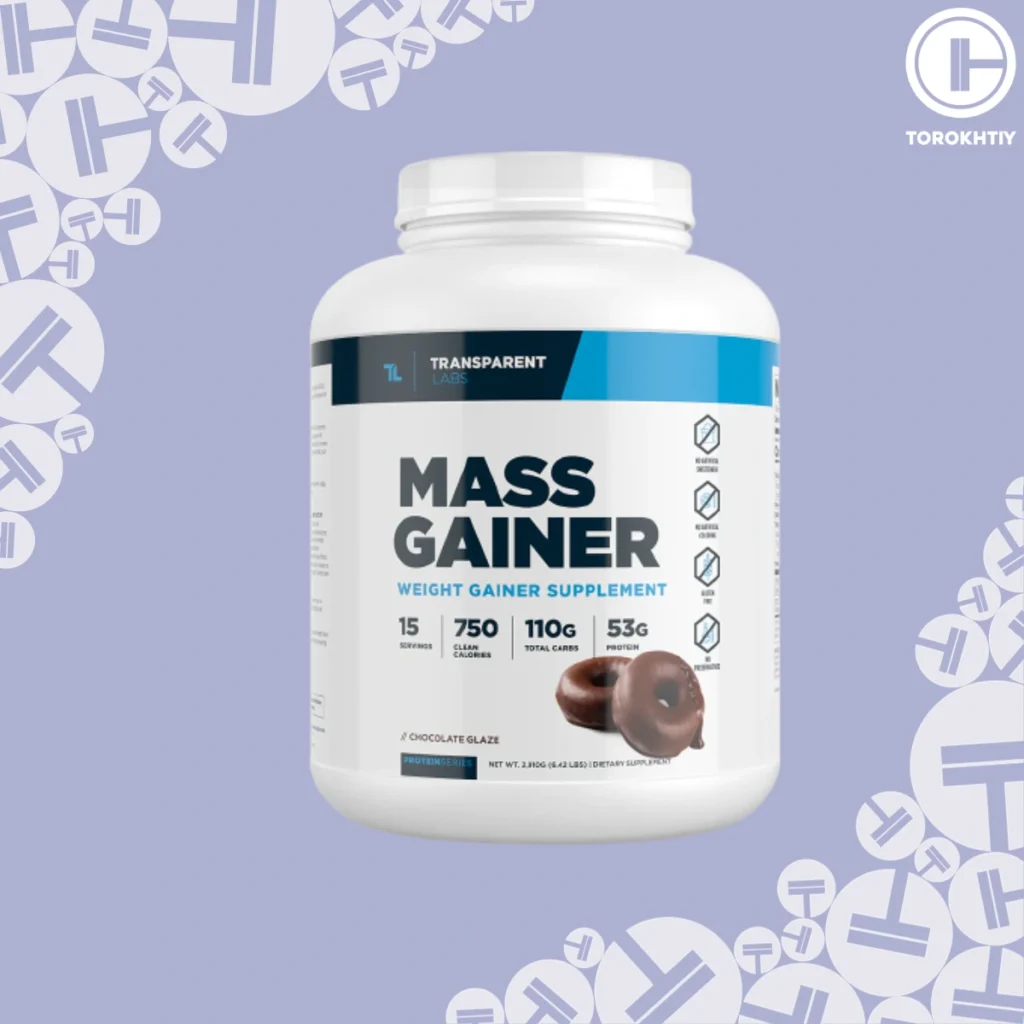
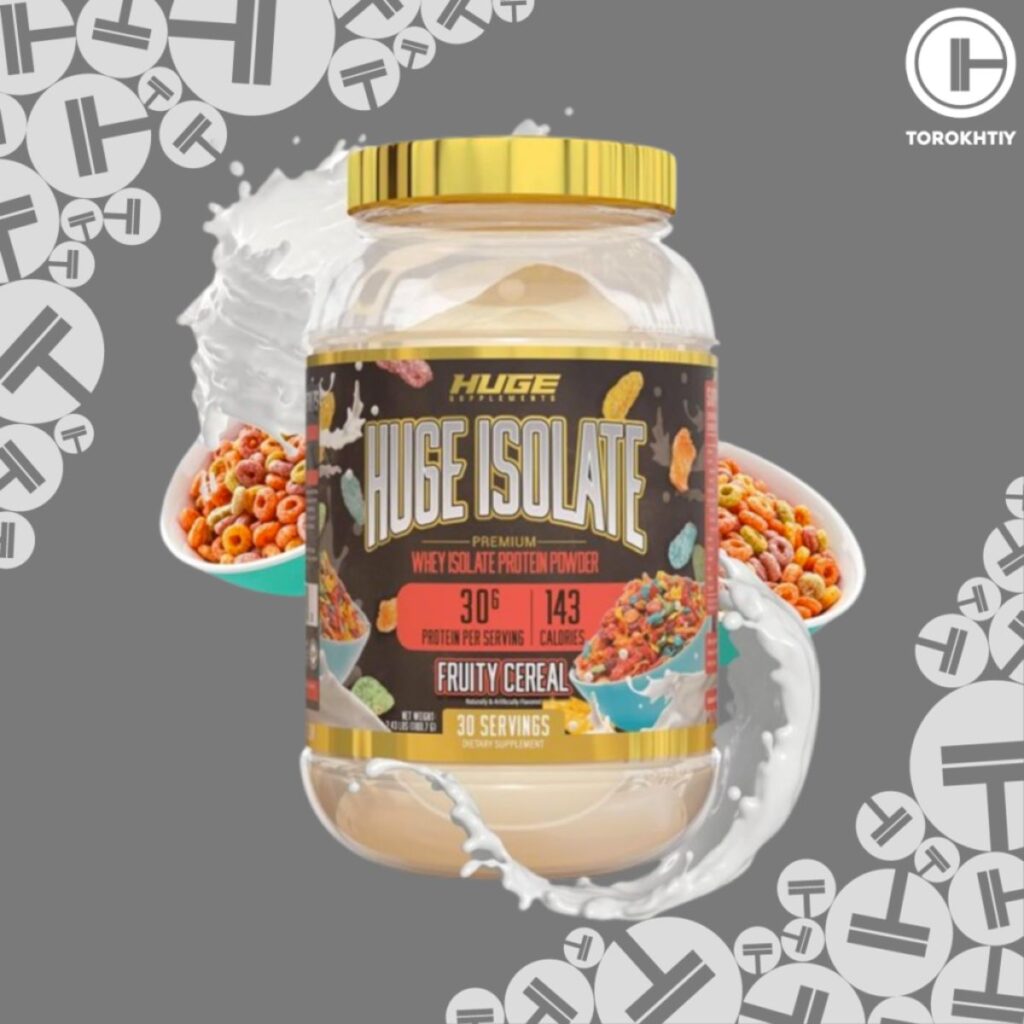
Still have questions after reading our article? Unlock your full potential by engaging with our experts and community! Don’t hesitate — leave a comment below and Jacek Szymanowski will provide a personalized answer and insights to help you reach your goals.